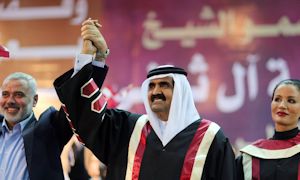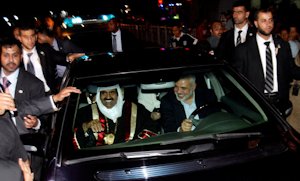By Pinhas Inbari
Emir Hamad of Qatar, who visited the Gaza Strip last week, became the first head of state to be hosted by the Hamas government there. His visit granted the first de facto recognition of Hamas’ legitimacy as the ruler of the coastal enclave.
The formal justification for the visit was a generous US$ 400 million donation toward housing, healthcare and infrastructure projects intended to rehabilitate Gaza after the 2009 war with Israel.
 The happiness in the strip over the high profile visit was sharply contrasted by the anger in Ramallah. Palestinian Authority President Mahmoud Abbas sent angry letters to both Emir Hamad and to Egypt’s President Morsi, saying that the visit would solidify the split among Palestinians and encourage Hamas to declare independence. He argued that it would have been better for the emir to arrive in Ramallah first and then go to Gaza together with PA leadership in order to strengthen the "legitimacy" embodied by the Palestine Liberation Organization (PLO) led by Abbas.
The happiness in the strip over the high profile visit was sharply contrasted by the anger in Ramallah. Palestinian Authority President Mahmoud Abbas sent angry letters to both Emir Hamad and to Egypt’s President Morsi, saying that the visit would solidify the split among Palestinians and encourage Hamas to declare independence. He argued that it would have been better for the emir to arrive in Ramallah first and then go to Gaza together with PA leadership in order to strengthen the "legitimacy" embodied by the Palestine Liberation Organization (PLO) led by Abbas.
In addition to Ramallah's concerns about the political implications of the visit, it is also vexed by its economic implications. While Ramallah is struggling to pay monthly salaries to government employees, Hamas is getting an economic boost. The old slogan that promised the West Bank under Fatah to prosper and Gaza under Hamas to decline has proven to be the opposite of the reality on the ground.
Ramallah was not alone in its opposition to the visit as Iran also opposed the high-level diplomatic foray. A pro-Iranian website ‘Islam Times’ described it as "suspicious" and confirmed that Qatar could not "buy" Gaza.
Both the Iranian comments and the Qatari visit underscored the struggle between Hamas’ local and diaspora leadership. The outgoing leader Khaled Mashal’s second in command, Musa Abu Marzuq, is challenged by Gaza’s Prime Minister Ismail Haniyeh in the fight for the leadership of the organization. While the Muslim Brotherhood, and with it Egypt and Qatar, stands firmly behind Abu Marzuq, Iran is supporting the local leadership in Gaza. It views Qatar’s recent diplomatic effort as an attempt to win over Gaza to the Muslim Brotherhood.
 Qatar, in turn, has tried to convince the leadership in Gaza to endorse Abu Marzuq and the Hamas leadership in the Diaspora. It has argued that Hamas’ chiefs must continue to stay away from Gaza so as not to be at Israel’s mercy and in danger of targeted assassinations and border closures. However, Hamas’ Gazan leadership cannot endorse these recommendations as Iran is already deeply rooted in the territory and able to unleash a series of terrorist attacks inside the Gaza Strip should Hamas seek to wriggle out of its sphere of influence.
Qatar, in turn, has tried to convince the leadership in Gaza to endorse Abu Marzuq and the Hamas leadership in the Diaspora. It has argued that Hamas’ chiefs must continue to stay away from Gaza so as not to be at Israel’s mercy and in danger of targeted assassinations and border closures. However, Hamas’ Gazan leadership cannot endorse these recommendations as Iran is already deeply rooted in the territory and able to unleash a series of terrorist attacks inside the Gaza Strip should Hamas seek to wriggle out of its sphere of influence.
The escalation of rocket fire into Israel during the emir’s visit was likely a signal that Hamas was not ready to sever ties with Iran. In light of this, Qatar’s will probably default on its financial pledges, leaving the political and economic situation unchanged.







